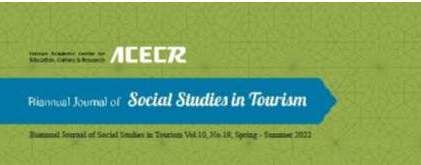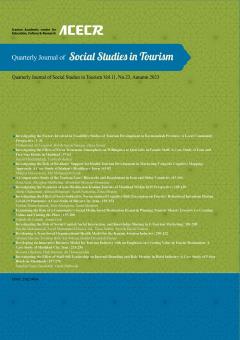-
-
List of Articles
-
Open Access Article
1 - Investigating the Factors Involved in Feasibility Studies of Tourism Development in Kermanshah Province: A Local Community Perspective
Mohammad Ali Feizpour Habib Ansari samani zahra naseri -
Open Access Article
2 - Investigating the Effect of Error Treatment Atmosphere on Willingness to Quit Jobs in Female Staff: A Case Study of Four and Five-Star Hotels in Mashhad
Ismail Malekakhlagh Farshad Ghaderi -
Open Access Article
3 - Investigating the Role of Residents' Support for Health Tourism Development in Marketing Using the Cognitive Mapping Approach: A Case Study of Isfahan’s Healthcare Town
mahnaz Doosti-Irani Mir Mohammad Asadi -
Open Access Article
4 - A Comparative Study of the Tourism Laws’ Hierarchy and Regulations in Iran and Other Countries
Ozra Azizi Ali Asghar Shalbafian aboutaleb ghasemi -
Open Access Article
5 - Investigating the Scenarios of non-Muslim non-Iranian Tourists of Mashhad Within 2025 Perspective
Arash Ghahreman Ahmad roumiani Sareh Nematian zahra bostan -
Open Access Article
6 - Investigating the Effect of Socio-Subjective Norms-induced Cognitive Risk Perception on Tourists' Behavioral Intentions During Covid-19 Pandemic: A Case Study of Shiraz City, Iran
Yazdan Shirmohammadi Jafar Ahangaran Amin Ghanbari -
Open Access Article
7 - Examining the Role of a Community’s Social Media-based Destination Brand in Winning Tourists’ Hearts Towards Co-Creating Values and Visiting the Place
Zohreh Ali Esmaili Armin Goli -
Open Access Article
8 - Investigating the Role of Social Capital, Social Interaction, and Knowledge Sharing in E-Tourism Marketing
haydar mohammadi mosavi jad seyed mohammad yosra salehi seyede hayde nemati -
Open Access Article
9 - Developing A Trust-based Organizational Health Model for the Iranian Aviation Industry
Gholam Hosein Torabian Badi Iraj Soltani Hamid Davazdah Emami -
Open Access Article
10 - Developing an Innovative Business Model for Tourism Industry with an Emphasis on Creating Value in Tourist Destination: A Case Study of Mashhad City, Iran
hossein ghadami hadi bastam Ali Hosseinzadeh -
Open Access Article
11 - Investigating the Effect of Staff Self-Leadership on Internal Branding and Role Identity in Hotel Industry: A Case Study of 5-Star Hotels in (Mashhad)
Jamshid Najari Beydokhti Omid Behboodi
-
The rights to this website are owned by the Raimag Press Management System.
Copyright © 2017-2025







